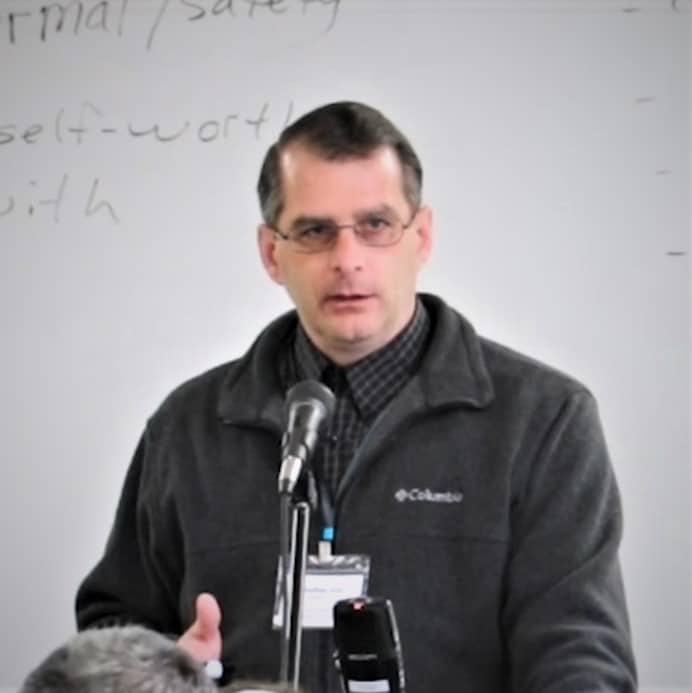You heard about the teacher that sent a note home with the Rufous, and it just simply said, “Rufous stinks. Please give him a bath.”
And the parents sent a note home, not home, sent a note back to school that said, “Rufous ain’t no rose. Don’t smell him. Learn him.”
I personally feel that teachers—that’s one category. School board is another category, and church leadership is yet another.
I think as a general operating principle that teachers ought to have in relating to dysfunctional homes is, when they discuss with the parents, they need to talk about the what and not the why about the situation. The what not to why.
Let me illustrate. We had something more on a slightly annoying side of things that was occurring in a school where I taught. The children came from a home. They were they weren’t really being raised. They were just kind of growing up. (It was. I mean. They were they member families. I mean, very, very admirable in many ways, but their parenting skills were perhaps a little lower than average. I don’t know how to describe this. I’m just trying to say it kindly and honestly. The children maybe were a bit neglected, but yet there were many things that we can learn from them, if you understand what I’m saying.) The children came to school with their barn boots. The same boots that they milk the cows with were coming to school, and they line them up with the rest of the children. And it was a problem.
It was it was slightly annoying, the first and second and third time that happened. But when wintertime came, then this stuff would be frozen on their boots, and it would make long rivulets across the hallway. OK. And this was this was making a problem in school.
Now, let’s go back to what it was demonstrating. As a teacher, the teacher should… I think at that point there should have been some communication with the him, right? Because it was actually affecting the way the other students were looking at those children. Those kinds of things obviously will.
For the teacher to go in to that conversation on a why premise, it’s going to sound a little bit like this, “You guys really need to buy two pairs of boots for your children. You’re just too… You’re not thinking. Come on! Wake up!” That that would be more of a why premise. Or that’s, of course, very direct and very, very much in response to what’s on the floor. But it was true that the children were being neglected. It was true that their hygiene had issues and so on.
It would be much better to say, “I just thought you might want to know what is happening at school. In the morning, the children’s boots are going out. It’s making a problem in the hallway. That’s what’s happening.”
And what I have found as a teacher very often the parents, at that point switch into a why. If you’re invited into a why type of conversation, that is completely different than using that as your point of entry.
I really think that somewhere we need to determine, is this making a problem at school? Is it truly making a problem at school? If it’s truly making a problem at school, than address it.
And now I’m coming around to this question, when does the minister get involved? (Wherever that was raised.) If it’s a school problem, then let’s not overinflate the situation by getting the minister involved too soon. I would hope that the our boards are proactive enough that many of these things can be handled on a school level. I think there are those times when we need to realize that even Jesus Christ can’t help everyone if they don’t want help, if they don’t respond to his… I mean, he was the one that always gets it right so far as compassion and care and extending help, but a lot of people reject his offers as well. Yes.
[Audience Question]
That’s one thing that is a guiding principle for me, specifically thinking about this instance, that we’re not a public school. We don’t take everybody. And there’s instances where we have to be honest, the school is not a place. We have 15 other families that need our attention. The school is not the place to help this child. Let’s go to the community and find somebody that’s willing to give brownies every day. We’re not that place.
[Jonathan Erb]
I know of a community that has multiple Mennonite communities in the same geographical area where there was a needy family that wanted to enroll their children to school. And the one school said, “We’re not equipped.”
Me, looking on, I would have thought they had more resources, but I didn’t know the whole story, obviously. They just said, “we’re not equipped, we can’t take you on right now.” But they actually recommended another school that I would have said, looking on, was looking on was less equipped. That less equipped school—you know, my own incorrect judgment—took them in and did most of that family and is having a reasonable measure of success.
We can’t help them all, right? We need to give a good, honest assessment when, you know, we’re that enrollment question, “are we really equipped to deal with this?”
And I would—right along with that—I would strongly urge the board to stay in touch with their teachers. They are, after all, the ones that are engaging these students on our hourly basis. And it can be energy-draining work.
When Jesus dealt with people that were needy, Jesus himself said that, “Who touched me? Virtue went out.” This is a virtue, whatever, you know what I mean. Virtue flows out of your teachers, and you need to stay there as a support role for sure.
Another thing that I think, along with this, as far as what boards can do, is be sure that you have a communication chain. Have it clearly understood who the teachers should be talking to. And, you know, when some of these things get get messy, maybe the teacher, you know, should be following a different channel of communication than what we would normally. Maybe there needs to be one contact person in the board and that kind of thing.
By all means, support your teachers or your teacher may burn out unnecessarily.






